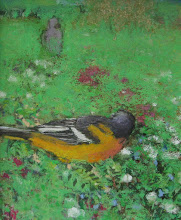This exchange about a word-mystery, between the American poet Ezra Pound and the language scholar (Doctor) Emil Levy, took place in 1911 in Freiburg:
. . . Doctor, what do they mean by noigrandres?
And he said: "Noigandres! NOIgandres!
You know for seex mon's of my life
Effery night when I go to bett, I say to myself:
Noigandres, eh, noigandres,
Now what the DEFFIL can that mean!"
Emil Levy did solve the word-mystery: noigandres means to protect from, to ward off ennui. And so a lovely line of poetry/song from the Provencal--a language of the medeival troubadours--can now be understood:
E jois lo grans, e l'olors d'enoi gandres
And joy is its seed, and its smell banishes sadness
The provencal poet is conjuring a flower, after he has heard "birdsong that whirls and turns" ("sona e tint e tart"). (All this word-talk can be found in Hugh Kenner's book on Pound in a chapter called The Invention of Language.)
It is a lovely notion, yes, a word appearing again that brings a new way for us to banish sadness.
Ask The Prairie Ecologist (Again)
2 days ago











No comments:
Post a Comment